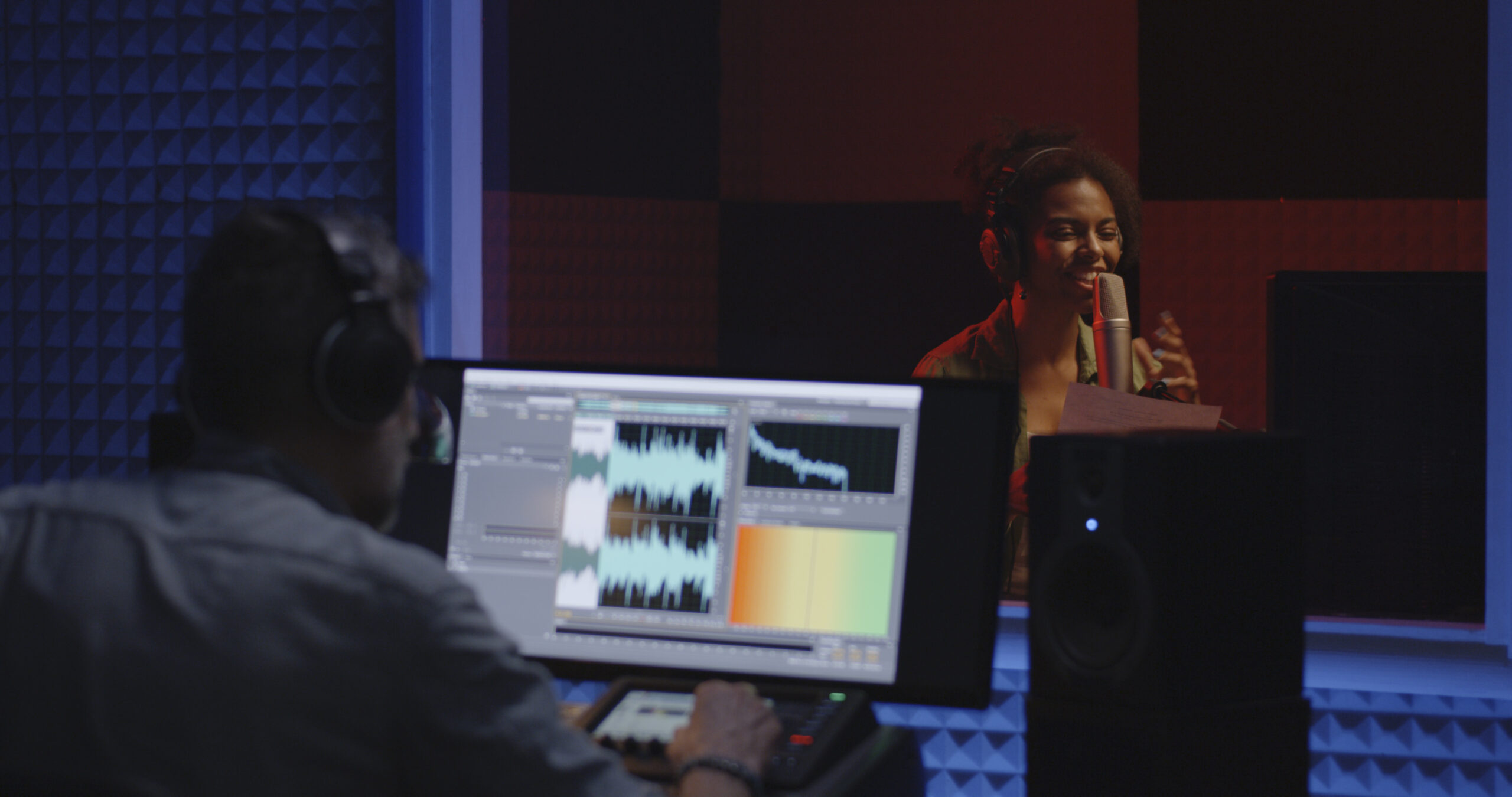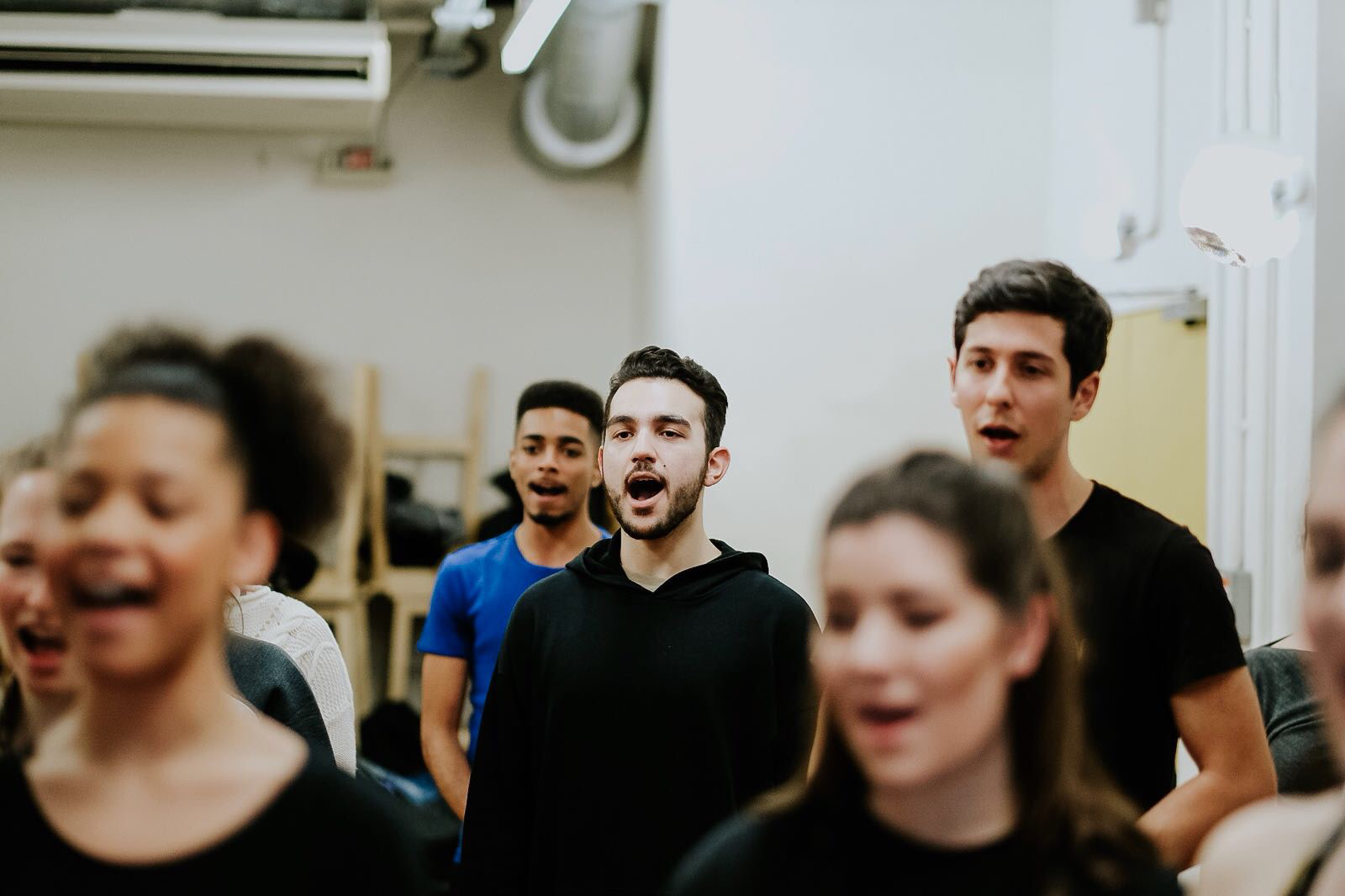Voice work should come from a place of joy… And other top tips from voice coach and director Barbara Houseman.
Barbara Houseman has worked extensively as a voice and acting coach, as well as a theatre director. Her client list is formidable, having worked with everyone from Kenneth Branagh to Daniel Radcliffe. At our recent Open House in London, Barbara hosted a voice workshop and shared her top insights into improving your voice practice. Here are our notes with of the key take away points.
1. Make it about ease
The real magic in life is actually going, ‘I’m ok, I’m enough. I’m proud of this and I’m still fine.’ Because actually, when you feel okay about where you are, you can work really hard on things – it doesn’t make you complacent, it just makes you able to work. I think the real magic is a kind of self acceptance of joy and play.
Before anything else, Barbara says it’s important to remove tension from the body – many problems can be resolved simply by working with ease rather than effort. Then, you can mover on to explore vocal support. This is about ensuring a steady flow of pressurised air through the larynx – without adequate pressure the throat muscles will try to compensate for the lack of pressure by squeezing. Vocal support is a natural function in the body – we all supported our voices as young children. It’s a question of reconnecting with that natural function and NOT about pushing with the abdominal muscles. Imagining that your throat is deep inside your belly, that the sound comes up from there can be an effective way to get the brain to reconnect with the deep abdominal muscles and stop it sending messages to the throat which can lead to unhelpful tension. Any time you experience ease, pleasure or joy in the body you know you are on the right lines. A voice that is easy on your body will be easy on the listeners ears and on your throat!
2. Do the work first
If you want freedom in performance, you have to do more preparation!
You can’t expect to be good without doing practising! It’s important to be okay with finding things hard at first. Be excited when it’s difficult and keep working through it with joy and ease, then you’ll improve. We often thing there are two muscles states but in fact it’s more useful to think in terms of four: two which are bad for the voice – tense muscle and sluggish muscle; two which are good – engaged muscle and released muscle. Learning how to engage AND release muscles so you can use them again it very important. Working with a sense of confidence, cockiness or flintiness will help the muscles engage and remember to…
3. Be playful!
Divide your time. Do your session, then your play.
Allow your body to ease into your voice work, keep investigating how sounds feel in your body and take note. Being playful is just as important as immersing yourself in the technical work that you do, so try to combine a little time for each in your practice each day (rather than spending hours on technical work and then hours at play!). Research suggests that playfulness particularly aids accent work. Once you have mastered the technical basics of an accent, let yourself loose and go over the top if you want to – adopt the posture and the psychology of the accent. Think about the geography associated with the accent and how this can manifest physically. Swim in and own the accent, and have some fun with it!
4. Don’t take notes personally
Learn to separate an interpretational difference from a note on your acting… Your job as actors is to keep offering – the more you offer, the more a director can respond. You must get brave about offering and not be attached to the offers.
It can be hard not to take the notes you are given in a casting personally, but it’s important to remember that it’s not about you being “bad”. There are lots of reasons why people don’t get cast – many are very hard to predict, and have nothing to do with your abilities. Be generous, offer what you can and you will get something back.
5. Silence your internal critic – it doesn’t help!
Don’t think there are people out there not doing the work, and don’t think you should be good without doing anything. You are allowed to be bad before you’re good, you know!
It’s important to learn to dismiss the internal critic as you work – it will only hold you back! Letting go of this critic and learning to trust in the work that you’re doing is essential. If you notice any behaviour change in your voice during an audition, or performance, know that it comes as a result of change in what you are thinking. Ask yourself ‘What story am I really telling myself about the audition or performance when my voice behaves in a way I don’t want?’ If you are telling yourself that the situation is one where you could be judged, where you could fail, that will send the body into protection, and even panic, mode, the body will tense up and you voice will be compromised. So you need to tell yourself a different story that doesn’t make you feel under threat!
6. At some point, you have to let go
You have to find the reframe that works for you… your intention can be to make [an audition] a comfortable place for everyone… If it is just about you making it a pleasant space for everyone, that can work.
Once you’ve done the work you have to just let go and trust that you can do it. It’s rather like jumping out of a plane you just have to trust that your parachute is there!
At some point you just have to go, ‘And now I have to trust.’
Read more about Barbara’s work and her insights here. There will be more Open House events later in the year, so keep a look out for more workshops like these!












